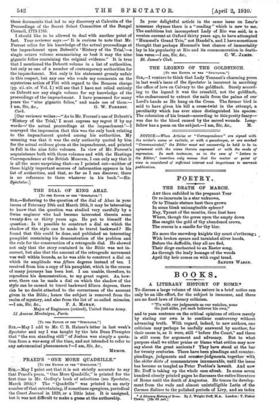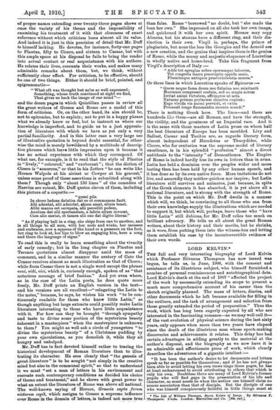BOOKS.
A LITERARY HISTORY OF ROME.* To discuss a large volume of this nature in a brief notice can only be an idle effort, for the subject is immense, and there are no fixed laws of literary criticism.
"'Es with our judgments as our watches, none Go just alike, yet each believes his own," and to pass sentence on the critical opinions of others merely by stating our own is to continue controversy without advancing truth. With regard, indeed, to new authors, one criticism may perhaps be usefully answered by another, for their cause is, as it were, still "before the Court," and there is still room for argument and advocacy. But to what purpose shall we either praise or blame what critics may now say about the great ancients P They have stood at the bar for twenty centuries. There have been pleadings and counter- pleadings, judgments and counter-judgments, together with the obiter dicta a commentators innumerable, until the issue has become as tangled as Peter Peebles's lawsuit. And now Mr. Duff is taking up the whole case afresh. In some seven hundred closely printed pages he discusses the entire literature of Rome until the death of Augustus. He traces its develop- ment from the rude and almost unintelligible Latin of the Carmen Sahara to the polished periods of Livy, and an index * A .Literary History of Home. By J. Wright Duff, M.A. London : T. Fisher Unwin. [12s. 6d .net.]
of proper names extending over twenty-three pages shows at once the variety of his theme and the impossibility of examining his treatment of it with that closeness of exact reference without which criticism loses almost all its value. And indeed it is just in this precision of detail that Mr. Duff is himself lacking. He devotes, for instance, forty-one pages to Plautus, fifty to Cicero, and sixteen to Caesar, but with this ample space at his disposal he fails to bring the reader into actual contact or real acquaintance with his authors.
He relates their lives, recounts their works, and makes many admirable remarks about them, but, we think, without
sufficiently clear effect. For criticism, to be effective, should be one of two things. Either it should be brief, pointed, and epigrammatic- " What oft was thought but ne'er so well expressed; Something, whose truth convinced at sight we find, That gives us back the image of our mind"—
and the dozen pages in which Quintilian passes in review all the great writers of Greece and Rome are a model of this form of criticism. Or, on the other hand, its aim should be, not to epitomise, but to explain ; not to put in a happy phrase what we already know or feel, but to instruct us where our knowledge is imperfect, and to guide us to a just apprecia- tion of literature with which we have as yet only a very partial familiarity. And in this latter case a very large use of illustrative quotation is beyond doubt essential, for other- wise the mind is merely bewildered by a multitude of descrip- tive phrases which leave little impression upon it because it has no actual experience with which they correspond. Of what use, for example, is it to read that the style of Plautus
is "lively," "coloured," and " exuberant "; that the diction of Cicero is "sonorous," or that in his Letters "he can write like Horace Walpole at his airiest or Cowper at his gravest,"
unless some proof of these assertions is submitted along with them P Though only "about 130 lines" of the comedies of Naevius are extant, Mr. Duff quotes eleven of them, including
.this picture of a coquette;—
"quasi pila
In chore ludens datatim dat se et communem facie Alii adnutat, alii adnictat, alium amat, alum tenet. Alibi mantis est occupata, all percellit pedem, Anulum dat all spectandum, a labris alium invocat, Cam alio cantat, et tamen alii sun dat digito literas."
"As if playing ball in a ring, she skips from one to another, and is all things to all men, with her nods and winks, her caresses and embraces, now a squeeze of the hand or a pressure on the foot, her ring to look at, her lips to blow an engaging kiss, here a song and there the language of signs."
To read this is really to learn something about the vivacity of early comedy ; but in the long chapter on Plautus and Terence quotations almost disappear amid the mass of comment, and in a similar manner the oratory of Cato the Censor receives almost as much illustration as that of Cicero ; while from Caesar there is not a single word except the phrase veni, vicli, vici, which is, curiously enough, spoken of as "that notorious message of brief fustian." And yet even where, as in the case of the Latin poets, he does quote more freely, Mr. Duff prints an English version in the text— and his versions are all excellent—" relegating the Latin to the notes," because, he says, he wishes his work "to be con- tinuously readable for those who know little Latin," as though anything but large extracts could possibly make Latin literature interesting to those who have little acquaintance with it. For how can they be brought "through sympathy and taste to divine some portion of the mysterious beauty
inherent in a masterpiece" when the masterpiece is unknown to them P You might as well ask a circle of youngsters "to
divine the mysterious beauty" of a Christmas pudding by your own ejaculations, as you demolish it, while they sit hungry and unhelped.
Mr. Duff has in fact devoted himself rather to tracing the historical development of Roman literature than to illus- trating its character. He sees clearly that "the genesis of • great literature" is to be sought "not simply in the creative mind but also in the communal spirit," so that to understand • it we must "set a man of letters in his environment and recreate such contemporary conditions as decided his choice of theme and treatment," and he shows with great power to what an extent the literature of Rome was above all national.
The well-known saying of Horace, Graecia capta ferunt vic,torent cepit, which assigns to Greece a supreme influenc,e over Rome in the domain of letters, is indeed not. more true than false. Rome " borrowed " no doubt, but "she made the loan her own." She impressed on all she took her own image, and quickened it with her own spirit. Horace may copy Alcaeus, but his stanzas have a different ring, and their dis- tinction is their own. Virgil is, perhaps, the prince of plagiarists, but none the less the Georgics and the Aeneid are a new creation, and the genius that inspires them is the genius of Rome, while the massy and majestic eloquence of Lucretius is wholly native and home-bred. Take this fragment from Virgil's description of Italy :—
" Adde tot egregias urbes operamque laborem, Tot congesta manu praeruptis oppida Basis,
Fluminaque antiquos praeterhibentia muros."
Or these lines in which Lucretius speaks of Epicurus " Quem neque fama deum nec fulmina nec minitanti Murmurs compressit coelum, sad eo ma,gis scram Irritat animi virtutem, effringere ut arts Naturae primus portarum claustra cupiret : Ergo vivida vis animi pervicit, et extra
Processit longe flammantia moenia mundi."
There is nothing Greek here. The lines—and there are hundreds like them—are all Roman, and have the strength,
the virility, and the greatness of an Imperial race. And it is the same with those masters of Latin prose on whom half the best literature of Europe has been moulded. Livy and Sallust, Caesar and Tacitus are, as regards literary form, almost independent of Herodotns or Thucydides, while Cicero, who for centuries was the supreme model of literary excellence, is in his splendid " profusion " almost a direct antithesis to the " intensity " of Demosthenes. The Empire of Rome is indeed hardly less its own in letters than in arms.
Latin has held a dominion over the peoples wider and more lasting than has been held by any other human speech, and it has done so by its own native force. Mere imitations do not live, and assuredly they neither quicken nor inspire ; but Latin literature still survives and animates, just because, in spite of the Greek elements it has absorbed, it is yet above all a national literature, and is strong with the strength of Rome.
This is the point on which Mr. Duff dwells in a manner which will, we think, be convincing to all those who can from their own knowledge supply the illustrations which are needed to support it, but which will, perhaps, leave those who "have little Latin" still dubious, for Mr. Duff relies too much on brilliant advocacy. He tells us all about the great Roman writers, about their history and their merits, but he shrinks, as it were, from patting them into the witness-box and letting them establish his case by the incontrovertible evidence of their own words.











































 Previous page
Previous page